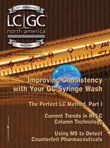Peaks of Interest
JEOL receives Omega Award; SGE and Australian Proteome Analysis Facility sign agreement; Spark Holland achieves ISO certification; Waters and Northeastern University open laboratory; Eksigent signs Korean distribution agreement
JEOL receives Omega Award
For the seventh consecutive year, JEOL USA, Inc. (Peabody, Massachusetts), has received the Omega NorthFace Scoreboard Award in recognition of its commitment to providing exemplary service and exceeding customer expectations.
"We at JEOL are proud of our continuous and measurable improvement over the years," said Patrick McGinley, Director of Service. "Supplying excellent service requires a corporate-wide commitment to satisfying the customer's needs."
SGE and Australian Proteome Analysis Facility sign agreement
SGE Analytical Science (Austin, Texas) announced it has entered into a memorandum of understanding under an Australian government commercial-ready grant with Australian Proteome Analysis Facility, Ltd. (Sydney, Australia), a leading international proteomics service provider and technology developer for the development of applications of SGE's liquid chromatography and micro fabrication technologies.
APAF and SGE plan to collaborate on the development and commercialization of new chromatography products for the protein biomarker discovery markets. APAF will publicise SGE's products under its services and skill-training programs to its customers and develop new ProteCol kits for a variety of applications. Once feasibility is established, customers will then purchase the kits directly from SGE.
Spark Holland achieves ISO certification
Spark Holland BV (Emmen, the Netherlands) received the ISO 13485:2003 certificate from its notifying body, the KEMA. This ISO quality system is designed for companies delivering to the clinical market. Spark Holland has registered its Symbiosis Pharma system as an FDA Class 1 Medical device and certified it as a CE IVD device. The Symbiosis system accepts raw biological samples, like plasma or urine, cleans them up, performs LC separation and then injects it directly into the MS.
Waters and Northeastern University open laboratory
Waters Corporation (Milford, Massachuesetts) and Northeastern University today opened the doors of the Waters Mass Spectrometry Laboratory within the Barnett Institute of Chemical and Biological Analysis. The new laboratory is dedicated to studying protein shapes and characteristics to provide pharmaceutical and biotechnology innovators with the tools necessary to develop new treatment options for some of the world's deadiest diseases, like AIDS and cancer.
Eksigent signs Korean distribution agreement
Eksigent (Dublin, California) announced a distribution agreement with Interface Engineering (Seoul, South Korea), a division of Bio-Medical Science Co., Ltd. The agreement covers sales and service of the NanoLC and ExpressLC HPLC product lines in Korea.
Interface Engineering Co., Ltd. has been serving local clients and is a Korea's leading companies in the analytical field, especially in pharmaceutical and environmental research markets.

New TRC Facility Accelerates Innovation and Delivery
April 25th 2025We’ve expanded our capabilities with a state-of-the-art, 200,000 sq ft TRC facility in Toronto, completed in 2024 and staffed by over 100 PhD- and MSc-level scientists. This investment enables the development of more innovative compounds, a broader catalogue and custom offering, and streamlined operations for faster delivery. • Our extensive range of over 100,000 high-quality research chemicals—including APIs, metabolites, and impurities in both native and stable isotope-labelled forms—provides essential tools for uncovering molecular disease mechanisms and exploring new opportunities for therapeutic intervention.
New Guide: Characterising Impurity Standards – What Defines “Good Enough?”
April 25th 2025Impurity reference standards (IRSs) are essential for accurately identifying and quantifying impurities in pharmaceutical development and manufacturing. Yet, with limited regulatory guidance on how much characterisation is truly required for different applications, selecting the right standard can be challenging. To help, LGC has developed a new interactive multimedia guide, packed with expert insights to support your decision-making and give you greater confidence when choosing the right IRS for your specific needs.

.png&w=3840&q=75)

.png&w=3840&q=75)



.png&w=3840&q=75)



.png&w=3840&q=75)









